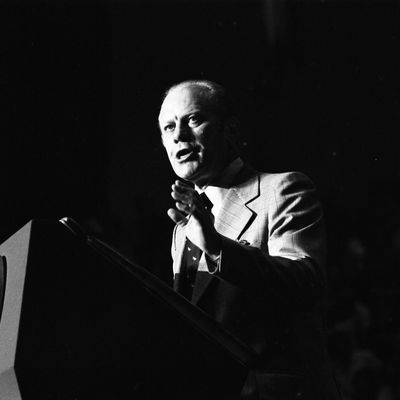
For baby boomers, the minute it became apparent the United States would finally end its military involvement in Afghanistan, even as the Taliban rapidly took over the country, images from the shocking end of the Vietnam War — America’s longest before this one — came flooding back. They were certainly on the mind of the baby-boomer-in-chief when he spoke of the endgame in July:
Now that the images and the reality of two bitterly divisive and costly wars ending in the triumph of America’s adversaries are converging so dramatically, those mulling the political impact of the debacle in Kabul should take a look back at the events of April 1975. Did the calamitous end of the Vietnam War change hearts and minds in this country? For that matter, did the fall of Saigon play a material role in the premature end of Gerald Ford’s presidency in the 1976 election?
Without question, the traumatic end of America’s first televised war made an impression on those of us watching the horrific scenes of Vietnamese allies and collaborators hanging from the tracks of overcrowded helicopters, desperately seeking rescue from Vietnam’s new rulers. For a moment, those of us who had opposed the war and those who thought it should have been prosecuted more violently were united in feeling empathy toward the terrified would-be refugees and some shame about their imminent abandonment. It wasn’t really clear until much later that a lot of the chaos surrounding the final withdrawal of U.S. military and diplomatic personnel was attributable to an earlier Ford administration decision to evacuate as many vulnerable Vietnamese as possible (recognizing that protecting the entire South Vietnamese Army and government was impossible). Still, photos of 400 stranded Vietnamese in the U.S. Embassy courtyard as the last helicopter flew off were searing.
While the final collapse of South Vietnamese resistance in Saigon happened suddenly (North Vietnam took control on April 30, 1975), Ford had publicly announced the end of America’s involvement in Vietnam a week earlier, during a speech at Tulane University, to rousing applause. As with the serial announcements of the impending end of the “forever war” in Afghanistan by presidents Obama, Trump, and Biden, the primary public reaction to Ford’s acknowledgment of reality was relief. And despite the harrowing scenes of panic from Saigon, Ford’s job-approval rating (according to Gallup’s biweekly readings) ticked up from 39 percent to 40 percent immediately afterward.
Measuring the longer-term impact on Ford’s popularity is difficult. Just two weeks after the fall of Saigon, Khmer Rouge naval forces seized a U.S. freighter, SS Mayaguez, in international waters off Cambodia’s coast. Ford ordered a military rescue mission, which met and overcame Khmer Rouge resistance; all 39 Mayaguez crewmen were saved. By the end of May, Ford’s approval rating had jumped to 51 percent. In some respects, the incident represented a more palatable (if largely symbolic) end to the U.S. military adventure in southeast Asia.
The Vietnam endgame probably played an insignificant role in Ford’s close 1976 loss to Jimmy Carter. When Ford first took office after Richard Nixon’s resignation in August of 1974, his job approval rating shot up to 71 percent as the country rallied around the new president. But when Ford pardoned Nixon the next month, his approval rating quickly fell to 50 percent and remained in the 40s for most of his brief presidency. The Nixon pardon and the stain of Republican corruption, alongside a recession accompanied by rapid inflation, all had more to do with Ford’s political problems than what happened in Vietnam.
This accidental president (who had never been elected to any position outside his Michigan House district; he was appointed to the vice-presidency when Spiro T. Agnew resigned as part of a plea deal in a separate corruption scandal) very nearly lost the GOP nomination to Ronald Reagan in 1976. He trailed Carter badly in much of the general-election campaign until a late surge nearly produced an upset. By then, Vietnam was mostly a bad memory associated with Ford’s predecessors Nixon and Lyndon B. Johnson.
So does Ford’s (and America’s) experience show that Joe Biden can expect that the shock and dismay so many are feeling now about the situation in Afghanistan will be a blip on his presidency, not a threat to his reelection? Probably, although there are some differences in the two presidents’ situation that cut both ways. In Ford’s case, the opposition party was pretty firmly anti–Vietnam War by 1975. So despite some carping about how the administration handled the very end of the conflict and the attempted evacuation of vulnerable Vietnamese, few Democrats were going to criticize Ford for failing to redeploy troops or take similar efforts to “save” South Vietnam. Today’s Republicans, despite Trump’s responsibility for liquidating the U.S. military presence in Afghanistan and legitimizing the Taliban, have no compunction about blaming how it ended on Biden. But the entire climate of public opinion has changed enormously in the last 46 years thanks to partisan and ideological polarization. Biden will receive no quarter from Republicans, but will be supported by Democrats, whatever their misgivings about how he handled the denouement in Afghanistan.
The timing of this new problem for Biden is, however, perilous. Much of his domestic agenda is still pending in a Congress where Democrats, with no margin for error in either House, are struggling with internal divisions over the bipartisan infrastructure bill just passed by the Senate and the budget reconciliation bill looming just ahead. His job-approval rating has already been trending slowly downward (now dropping below 50 percent in the FiveThirtyEight averages), mostly thanks to public fears of the COVID-19 resurgence, its possible impact on the economy, and fresh inflation concerns. It’s possible the bad vibes from Kabul will retrospectively mark the end of what was a pretty limited honeymoon for Joe Biden. But for the immediate future, most Americans will spend less time thinking about Afghanistan with each passing day.






























